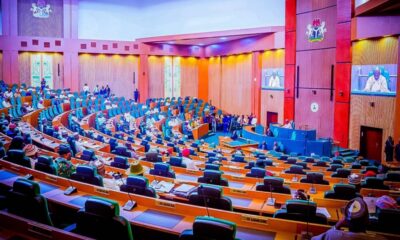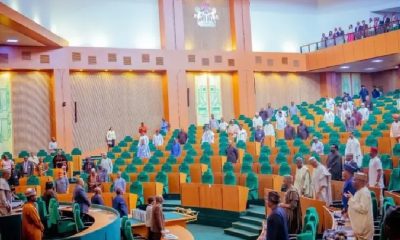Economy
Crude prices slump to $65 first time since 2021

Oil prices plunged this week to $65 per barrel as the United States import tariffs and an unexpected OPEC+ supply hike erased $10 per barrel from global benchmarks.
The price appreciated last week when US President Donald Trump imposed tariffs on any country that buys crude from Venezuela.
However, oil prices turned around the corner as of Friday, with Brent falling to $65, the first time since 2021.
According to oilprice.com, the combined effect of Trump’s import tariffs, OPEC+’s inopportune decision to speed up the unwinding of production cuts, and China’s retaliatory actions wiped off $10 per barrel from global oil prices, “with ICE Brent falling below $65 per barrel for the first time since August 2021.”
The US West Texas Intermediate crude futures lost $4.96, or 7.4 per cent to end at $61.99.
“Seeing backwardation barely change compared to the beginning of the week, one could assume that US tariffs are the defining factor for the price change. Nevertheless, this week will not go down well in the history of oil markets,” oilprice.com reports.
China’s retaliatory tariffs on US goods have escalated a trade war that has led investors to price in a higher probability of recession.
China, the world’s top oil importer, announced it will impose additional tariffs of 34 per cent on all US goods from April 10.
According to Reuters, nations around the world have readied retaliation after Trump raised tariffs to their highest in more than a century.
Aside from the tariffs, another factor that further pressured oil prices was the Organisation of the Petroleum Exporting Countries and Allies’ decision to advance plans for output increases.
The group now aims to return 411,000 barrels per day to the market in May, up from the previously planned 135,000 bpd.
Economy
SEE Black Market Dollar to Naira Exchange Rate Today – 7th May 2025

The dollar to naira rate keeps making headlines, and if you’re here, chances are you’re looking for today’s black market exchange rate – Wednesday, 7th May 2025. Whether you need to exchange dollars for business, personal use, or just want to stay updated, this post gives you the most accurate and up-to-date info on the dollar to naira rate in the parallel (Aboki) market.
We understand how quickly things can change in Nigeria’s forex market, so we’re committed to bringing you real-time figures and what’s influencing them.
What is the dollar-to-naira exchange rate on the black market, like the Aboki Fx?
The exchange rate for the US dollar (USD) to Nigerian Naira (NGN) in the parallel market, also known as black market, as of 7th May 2025, is N1,610 for 1 USD.
This rate is often sourced from the latest data provided by Bureau De Change (BDC) operators.
How much is a Dollar to Naira today in the Black Market?
What is the Dollar to Naira Exchange Rate at the Black Market, especially the Aboki Fx?
Because of the dynamics of supply and demand in the informal foreign exchange market, the Central Bank of Nigeria (CBN) official rates often differ significantly from those in the black market.
As of today, 7th May 2025, the black market buying rate for the US dollar is N1,600 while the selling rate is N1,610.
These rates change from time to time during the day, influenced by various factors including economic conditions, market speculation, and government policies.
The dollar-to-naira exchange rate in the black market has continued to fluctuate, reflecting the economic challenges and forex shortages in Nigeria.
In contrast to the black market, the Central Bank of Nigeria (CBN) maintains an official exchange rate. Today, the CBN rate for one dollar is N1,606.64.
The disparity between the official and black market rates highlights the pressure on the naira and the challenges in the country’s forex market.
Black Market Exchange Rate Today
Foreign Currency Buying rate Selling rate
DOLLAR ($USD) N1,600 N1,610
POUNDS STERLING (GBP) N2,120 N2,140
EURO (EUR) N1,780 1,800
CBN Exchange Rate Today
Foreign Currency Buying rate Selling rate
DOLLAR ($USD) N1,605.64 N1,606.64
POUNDS STERLING (GBP) N2,150.27 N2,151.61
EURO (EUR)
N1,823.68
N1,824.82
YUAN (CNY)
N222.49
N222.63
SAUDI RIYAL (SAR)
N428.07
N428.34
CRYPTOCURRENCY
At the time of posting
BITCOIN
1 BTC: NGN153M
1 NGN = 0.000000078BTC
ETHEREUM
1 ETH: NGN 2.9M
1 NGN: 0.00000034ETH
Variations in Forex Rates
Forex rates in Nigeria vary across different markets and platforms. The black market, official CBN rates, and rates offered by commercial banks and international money transfer operators all differ.
This discrepancy creates arbitrage opportunities and poses challenges for businesses and individuals needing foreign currency for legitimate transactions.
50 Dollars to Naira Today Black Market
For people looking to exchange 50 US dollars today, the rate in the black market will be approximately N80,000 if obtained at the buying rate of N1,600 per dollar.
For those buying from retailers, it would cost N80,500 at the selling rate of N1,610 per dollar.
100 Dollars to Naira Today Black Market
Exchanging 100 US dollars today in the black market will get you N160,000 if sold at the current buying rate.
For those purchasing dollars, it will cost them N161,000. This rate of increase no doubt affects businesses, travelers, and others who need dollars and other foreign currencies for overseas transactions.
500 Dollars to Naira Today Black Market
A larger transaction of 500 US dollars will result in N800,000 at the buying rate and N805,000 at the selling rate in the black market today.
The higher volumes reflect the ongoing need for dollars in the business community.
1,000 Dollars to Naira Today Black Market
For those who need up to 1000 US dollars, the black market will offer N1,600,000 at the buying rate and N1,610,000 at the selling rate.
Economy
75.5% of rural Nigerians now live below poverty line — World Bank

The World Bank has disclosed that a staggering 75.5 per cent of rural Nigerians are now living below the poverty line, reflecting deepening hardship in the country’s hinterlands.
This was revealed in the Bank’s April 2025 Poverty and Equity Brief for Nigeria, which paints a grim picture of worsening economic hardship, widening inequality, and persistent underdevelopment across much of the nation.
While poverty is widespread among urban populations, the report emphasised that the situation is significantly worse in rural areas, where economic stagnation, high inflation, and insecurity have exacerbated living conditions.
“Based on the most recent official household survey data from Nigeria’s National Bureau of Statistics, 30.9 per cent of Nigerians lived below the international extreme poverty line of $2.15 per person per day in 2018/19 before the COVID-19 pandemic,” the report stated.
The report also highlighted Nigeria’s enduring regional disparities. “Nigeria remains spatially unequal. The poverty rate in northern geopolitical zones was 46.5 per cent in 2018/19, compared with 13.5 per cent for southern ones. Inequality measured by the Gini index was estimated at 35.1 in 2018/19.
“Nigeria’s Prosperity Gap — the average factor by which individuals’ incomes must be multiplied to attain a prosperity standard of $25 per day for all — is estimated at 10.2, higher than most peers.”
Despite successive policy interventions, these figures underscore a persistent economic divide across the country.
The report’s demographic analysis found that children aged 0 to 14 years had a poverty rate of 72.5 per cent, reflecting the scale of deprivation among the youngest segment of the population.
Gender disparities were also observed, with 63.9 per cent of females and 63.1 per cent of males classified as poor under the $3.65 per day lower-middle-income threshold.
Education emerged as a significant determinant of poverty, with Nigerians lacking formal education experiencing a poverty rate of 79.5 per cent. This contrasts with 61.9 per cent for those with primary education and 50.0 per cent for secondary school graduates. Only 25.4 per cent of those with tertiary education were considered poor.
The report also drew attention to multidimensional poverty indicators, which further reflect widespread deprivation.
According to the World Bank, about 30.9 per cent of Nigerians live on less than $2.15 daily, 32.6 per cent lack access to limited-standard drinking water, 45.1 per cent do not have limited-standard sanitation, and 39.4 per cent have no electricity.
Education access remains a challenge, with 17.6 per cent of adults yet to complete primary education, and 9.0 per cent of households reporting at least one school-aged child not enrolled in school.
The report noted that even before the COVID-19 pandemic, efforts to reduce extreme poverty had largely stalled.
“Before COVID-19, extreme poverty reduction had almost stagnated, dropping by only half a percentage point annually since 2010. Living standards of the urban poor are hardly improving, and jobs that would allow households to escape poverty are lacking,” the report read.
Although the World Bank acknowledged recent economic reforms aimed at stabilising Nigeria’s macroeconomic outlook, it warned that persistently high inflation continues to undermine household purchasing power, particularly in urban areas where incomes have not kept pace with rising costs.
In light of the worsening situation, the Bank called for urgent policy action to shield vulnerable groups from inflationary shocks and to drive job creation through more productive economic activities.
Economy
Naira Records Marginal Decline Against Dollar at Official Market

The Nigerian naira experienced a mild drop in value on Friday, closing at ₦1,602.18 per dollar in the official foreign exchange market, based on figures released by the Central Bank of Nigeria (CBN).
This marks a decrease of ₦5.49 from the rate of ₦1,596.69 recorded on April 30, the last trading day before the May 1 Workers’ Day holiday—indicating a depreciation of approximately 0.34%.
Earlier in the week, from Monday to Wednesday, the naira remained relatively stable, exchanging at ₦1,599.95, ₦1,599.71, and ₦1,596.69 respectively.
Although the local currency showed some consistency mid-week, it wrapped up the week with a loss, following a sligh dip of 0.02% at the beginning of the week
-

 News5 hours ago
News5 hours agoReal cause of Herbert Wigwe’s helicopter crash revealed
-

 News24 hours ago
News24 hours agoTension As Lawmakers Warn of Public Revolt Over Insecurity
-

 Politics7 hours ago
Politics7 hours agoUghelli North PDP Holds Crucial Meeting
-

 News12 hours ago
News12 hours agoTinubu presents N1.78 trillion FCT budget to NASS
-

 News12 hours ago
News12 hours ago2027: Why Obi should reject VP slot — Tinubu’s aide
-

 News23 hours ago
News23 hours agoEdo Speaker, Two Other Lawmakers, Formally Join APC
-

 News24 hours ago
News24 hours agoRep Raises Alarm After Deadly Attacks In Borno, Says Boko Haram Is Returning Stronger
-

 News12 hours ago
News12 hours agoNnamdi Kanu wanted more states for Biafra – DSS




